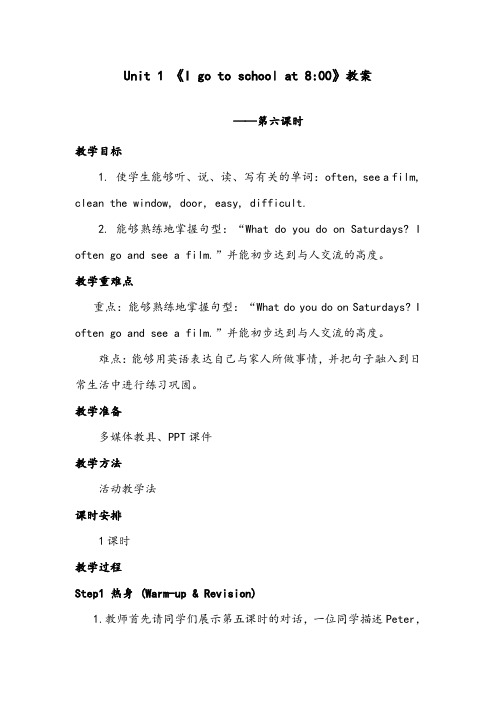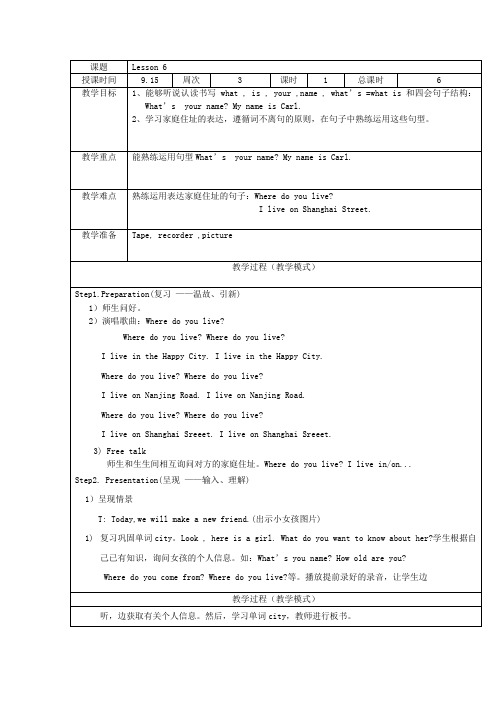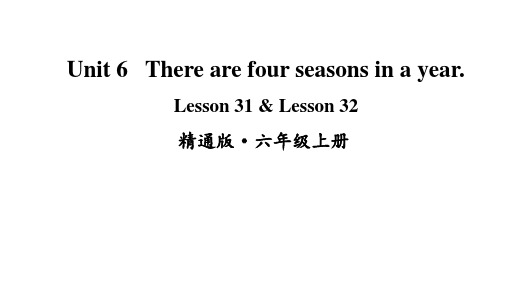人教精通版六年级上册英语Unit1(Lesson6) 课件
小学英语人教版六年级上册《unit6》课件

It’s warm and windy in spring. It’s hot and sunny in summer. It’s cool and cloudy in autumn and it’s cold and snowy in winter.
b.It’s hot and often sunny, sometimes It’s rainy, I usually go swimming.
c.It’s cool, sometimes it’s cloudy and windy, I usually go camping.
d.It’s warm and windy. I usually fly kites.
rainy cloudy sun ny snow y
Let’s read
spring
summer autumn winter
warm
cool
windy
sunny
cloudy
rainy
snowy
spring summer autumn winter
Read and match
a.It's cold, sometimes it’s snowy, I usually make snowmen.
A: Which season do you like best?
B:I like …best. A:Why? B:Because it’s….I can….
What’s your favourite season?
…
Tips:四人一组,和同伴讨论你自己最喜欢的季节。
【优质】小学英语人教精通版六年级上册Unit1 I go to school at 8:00 Lesson6优质公开课教案

Unit 1 《I go to school at 8:00》教案——第六课时教学目标1. 使学生能够听、说、读、写有关的单词:often, see a film, clean the window, door, easy, difficult.2. 能够熟练地掌握句型:“What do you do on Saturdays? I often go and see a film.”并能初步达到与人交流的高度。
教学重难点重点:能够熟练地掌握句型:“What do you do on Saturdays? I often go and see a film.”并能初步达到与人交流的高度。
难点:能够用英语表达自己与家人所做事情,并把句子融入到日常生活中进行练习巩固。
教学准备多媒体教具、PPT课件教学方法活动教学法课时安排1课时教学过程Step1 热身 (Warm-up & Revision)1.教师首先请同学们展示第五课时的对话,一位同学描述Peter,另一位同学描述Kate.如:T: Good morning, boys and girls. Last class we have learnt about Peter and Kate do on Saturdays. Who can describe them? P: Peter often goes and sees a film with his parents and Kate usually has piano lessons.T: What about Zhou Pei?K: She often plays piano and helps her mum to do housework on Saturdays.2. Let’s review教师展示上节课所学短语的图片,引导学生复习短语:see a film, play the piano, clean the window, clean the door, clean the floor.3. Let’s chantSs: What do you do on Sundays, Peter?Ss: I often do my homework on Sundays.Ss: What about Kate?Ss: I usually have chess lessons.4. Let’s discuss学生分组练习询问对方周日经常做的事情,并编成对话。
六年级上册英语教案-Unit1 (Lesson6) 人教精通版

精通版小学英语六年级上Lesson6教学设计教材内容和分析:1.通过实际的阅读过程,逐步培养学生的阅读兴趣,提高英语阅读技能。
2.开阔学生的视野,提高多元文化理解力。
1知识与技能:What do you do on Saturdays?I often go and see a film.What does Kate do on Saturdays?She usually plays the piano.2.过程与方法:本部分以连环故事的形式呈现本单元已经学习的重点句型,从而达到复习巩固的目的。
情感、态度、价值观:培养学生之间友好相处、团结友爱好。
3.教学重点: What do you do on Saturdays?I often go and see a film.What does Kate do on Saturdays?She usually plays the piano.4.教学难点:对已经学过的本单元知识句型进行综合运用,并理解巩固5.课前准备:投影a tape- recorder some pictures6.教学流程:Step 1. Warm-up. 1.Greetings.2.Sing a song:I see a sheep sitting on a jeep.I know the sheep is going to sleep.I see a film in a good seat.I clean the floor after seeing the film.I clean the window with our team.3.Show the pictures about see a f i l m\p l a y t h e p i a n o c l e a n t h e w i n d o w\c l e a nt h e d o o r\c l e a n t h e f l o o r."1.Step2. Presentation.2.The teacher shows some pictures ,let students guess gamesWatch carefully and tell me what they are .then guessWhere is he ?What does he do ?Where are they ?What do they do?3.趣味练习Tell the pupils they will listen to the tapeand ask them some questions.1.For example:A.What do they do Saturdays? He see a film.B.What does she doing ? She plays the piano2.Play the tape. Have pupils listen carefully andanswer the questions.3.Play the tape again. Have pupils listen andrepeat.pupils practise the dialogue in pairs.Do the role-play 然后,比赛。
六年级上册英语教案-Unit1Igotoschoolat8:00(Lesson6)|人教精通版

六年级上册英语教案-Unit1 I go to school at 8:00(Lesson6) |人教精通版教学目标1. 知识与技能:让学生掌握时间表达法,尤其是运用 "I go to school at 8:00" 的句型来表达日常活动的时间。
2. 过程与方法:通过情景模拟、小组讨论等互动方式,提高学生的英语口语表达能力和听力理解能力。
3. 情感态度价值观:培养学生守时、规律作息的良好习惯,增强团队合作意识。
教学内容1. 词汇:“hour”, “minute”, “o'clock”,“get up”, “go to school” 等与时间相关的词汇。
2. 句型:“I go to school at 8:00”, “What time do you get up?” 等。
3. 语法:时间的表达法,如“7:30” 读作“seven thirty”。
教学重点与难点1. 重点:掌握时间相关词汇,正确运用句型表达日常活动的时间。
2. 难点:时间的准确表达,尤其是半小时的表达方式(如“half past seven”)。
教具与学具准备1. 教具:课件、时间卡片、钟表模型。
2. 学具:英语课本、练习本、彩色笔。
教学过程1. 导入:利用课件展示不同的时间场景,引导学生用英语描述。
2. 新授:讲解时间表达法,通过举例和练习,让学生掌握句型和词汇。
3. 练习:分组练习,模拟日常活动的时间表达。
4. 巩固:听力练习,让学生听录音并回答时间相关问题。
5. 互动:小组竞赛,看哪个小组能最快最准确地完成时间表达任务。
板书设计Unit 1 I go to school at 8:00关键词:时间表达法、词汇、句型重点句型:“I go to school at 8:00”示例:7:30 “seven thirty”, 8:15 “a quarter past eight”作业设计1. 书面作业:完成课本练习,描述自己的日常活动时间。
人教版PEP小学六年级上册英语《Unit 6 How do you feel B Read and write》课件

Part 1(3)
2
“Don't worry, little ant. I won't sit on you,” says Robin.
won't=will not
Part 1(3)
2
“Don't worry, little ant. I won't sit on you,” says Robin.
Part 2(5-7)
4
Then he hears, “Let us
help you !”It is the ant and
all of his friends. They are strong. They pull Robin out of the mud. Everyone is happy!
Imitate and try to show
(有感情的跟读模仿并尝试表演)
Part 1(1-2)
It is a sunny morning. Robin
1
is going to sit on the grass when he hears,“Wait!” It is a little ant . He is afraid. “Please don't sit on me. One day I can help you.”
Imitate and try to show
(有感情的跟读模仿并尝试表演)
Part 1(1-2)
It is a sunny morning. Robin
1
is going to sit on the grass when he hears,“Wait!”
h ears
It is a little ant . He is afraid. “Please don't sit on me. One day I can help you.”
六年级英语上册UnitIgotoschoolat:教学课件人教精通版

Task6: Read and judge
1. Lucy gets up at 7:30 inintthheeamftoernoinogn. 2. Lucy is in Grade Six. 3. School begins at 89::3000.. 4. They have seven csluabsjseecstsa. day. 5. After dinner, Lucy watches TV for 30 minutes. 6. After dinner, she often read some books.
>>Presentation
Just read and talk
Task5: Read and say
Lucy’s Daily Life
Activities
Time
get up
7:30 in the morning
have breakfast
8:00
go to school
8:30
School begins.
>>Practice
Just read and talk
Listen and imitate
>>Practice
Let’s do survey
Do a survey about our daily life in groups of four and fill in the form.
Activity Time
>>Presentation
My daily life
I get up at seven in the morning.
I go to work at eight.
六年级英语上册Unit1Igotoschoolat800Lesson6教案人教精通版(三起)

能熟练运用句型What’s your name? My name is Carl.
教学难点
熟练运用表达家庭住址的句子:Where do you live?
I live on Shanghaiቤተ መጻሕፍቲ ባይዱStreet.
教学准备
Tape, recorder ,picture
教学过程(教学模式)
Step1.Preparation(复习 ——温故、引新)
Step3.Practice(操练 ——内化、熟练)
1)说唱歌谣。Let’s chant. Look, there are many cars on the road. 感知字母c的发音。
2)趣味表演。Let’s act. 教师仿照学生用书图片的布置教室,在小组间放上路标和指示牌。教师可招一名同学做示范。
T:Hello,…I want to see you. Where do you live?
S: I live at 56 Wuhan Road.
Step4.Production(练习——输出、检测)
A. to B. on C. in D. from E. about
1、I comeChina。
2、Pleasedmeet you。
课题
Lesson 6
授课时间
9.15
周次
3
课时
1
总课时
6
教学目标
1、能够听说认读书写 what , is , your ,name , what’s =whatis和四会句子结构:What’s your name? My name is Carl.
2、学习家庭住址的表达,遵循词不离句的原则,在句子中熟练运用这些句型。
小学六年级英语上册(人教精通版)Unit 6 There are four seasons in a year. Lesson 31 - Lesson 32课件

(2)become的意思是“成为;变成”,是一个中性词, 可用于好、坏两方面的变化。多指身份、职位等的变化, 暂时性的身心变化或永久性的自然变化,它强调变化的 过程已经完成,后面可接名词或形容词。
例句:他现在变成了一个大男孩。 He becomes a big boy now.
2. What is spring like? 春天是什么样子的?
Spring is the first season.
Play roles
What do you do in spring?
I fly kites with my friends.
I go on spring outings with my classmates.
What do you do in spring?
在这醉人芬芳的季节,愿你生活像春天一样阳光,心情 67、生人命生太贵过相短知暂,,何今用天金放与弃钱了。明20天.7.不14一20定.7能.1得42到0.。7.184时。3210分280时年371月分1144日-J星ul期-2二07二.14〇.2二02〇0年七月十四日 像桃花一样美丽,感谢你的阅读。 78、放勇眼气前通方往,天只堂要,我怯们懦继通续往,地收 狱获 。的20季:31节2就0:3在1前:41方7.。142.02.072.104T2u0e.s7d.1a4y2, 0J.u7ly.1144。, 2020年7月14日星期二二〇二〇年七月十
240、:3敏17而.1好4.学20,20不20耻:3下17问.1。4.。2072.01240.2:03210270.:1341.:2401270.1240.:230122002:301:32107:3.114:4.2102200:31:41
春去春又回,新桃换旧符。在那桃花盛开的地方, 45、不海要内为存它知的已结,束天而涯哭若,比应邻当。为Tu它es的da开y,始Ju而ly笑14。, 72.01240.2J0u2ly0270.1T4u.2e0sd2a0y2,0J:3u1ly201:43,122002:3017:/41142/200:2301:41 在这醉人芬芳的季节,愿你生活像春天一样阳光,心情 56、莫生愁命前的路成无长知,已需,要天吃下饭谁,人还不需 识要 君吃 。苦8时,3吃1分亏8。时T3u1e分sd1a4y-J, uJlu-2ly0174.1,42.022002J0uly 20Tuesday, July 14, 20207/14/2020
- 1、下载文档前请自行甄别文档内容的完整性,平台不提供额外的编辑、内容补充、找答案等附加服务。
- 2、"仅部分预览"的文档,不可在线预览部分如存在完整性等问题,可反馈申请退款(可完整预览的文档不适用该条件!)。
- 3、如文档侵犯您的权益,请联系客服反馈,我们会尽快为您处理(人工客服工作时间:9:00-18:30)。
Lesson 6
have breakfast
6:30 am
have lunch
at 12:00
have dinner 5:00 pm
go home
4:30 pm
get up
5:00 am
8:00 am
School begins.
I
} } WIt
单个名称
+ 动词单三
Introduce your friend's daily life
介绍你朋友的日常生活
用所给词的正确形式填空
1. I oftenp_l_a_y (play) the piano 2. She oftens_e_e_s__(see)a film. 3. He usuallyc_le__a_n_s___(clean)
2、书是人类进步的阶梯。二〇二〇年七月五日2020年7月5日星期日
这醉人芬芳的季节,愿你生活像春天一样阳光,心情像桃 3、会当凌绝顶,一览众山小。14:477.5.202014:477.5.202014:4714:47:527.5.202014:477.5.2020 4、纸上得来终觉浅,绝知此事要躬行。7.5.20207.5.202014:4714:4714:47:5214:47:52
5.I clean thefloor onSaturdays.(划线部分提问)
What do you do on Saturdays?
6.She plays the piano on Sundays.(划线部分提问)
What does she do on Sundays?
亲爱的读者:
春去燕归来,新桃换旧符。在那桃花盛开的地方,在 1、三人行,必有我师。20.7.57.5.202014:4714:47:52Jul-2014:47
花一样美丽,感谢你的阅读。 5、一寸光阴一寸金,寸金难买寸光阴。Sunday, July 5, 2020July 20Sunday, July 5, 20207/5/2020 6、路遥知马力日久见人心。2时47分2时47分5-Jul-207.5.2020 7、山不在高,有仙则灵。20.7.520.7.520.7.5。2020年7月5日星期日二〇二〇年七月五日 8、有花堪折直须折,莫待无花空折枝。14:4714:47:527.5.2020Sunday, July 5, 2020
2.I have dinner at 7:00.(否定句) I don't have dinner at 7:00.
3.She gets upat 6:00.(一般疑问句)
Does she get up at 6:00? 4.He takes a walk at 7:00.(否定句)
He doesn't take a walk at 7:00.
She usually sees a film , plays the piano, cleans the window , cleans the door and cleans the floor .
English grammar:
一般现在时:表示经常性或习惯性的动作或存在的 状态,常与 often ,usually,always,sometimes等连用。 结构:
watch TV
8:30 pm
6:20 am
cook breakfast
teach English
3:00 pm
read stories
7:00 pm
take a walk
7:30 pm
What does Kate do on Saturdays ?
What does Kate do on Saturdays ?
the door. 4. Does sheg_e__t _(get) up at 5:00? 5. Do youha__v_e_ (have) lunch at
12:00?
按要求改写句子 1.I watch TV at 6:00pm.(一般疑问句)
Doyou watch TV at 6:00pm?
